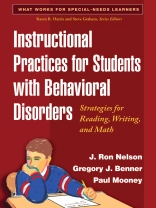Presenting a broad range of instructional programs and practices that are proven effective for students with behavioral disorders, this is the first resource of its kind for K–3 teachers and special educators. Described are clear-cut strategies for promoting mastery and fluency in early reading, writing, and math, while tailoring instruction to each student’s needs. Grounded in a three-tiered response-to-intervention framework that facilitates data-based assessment, decision making, and progress monitoring, the book includes helpful examples and reproducibles. A special chapter outlines instructional management procedures for enhancing student engagement and promoting positive behavior.
Содержание
1. Behavioral, Demographic, and Functional Characteristics of Students with Behavioral Disorders 2. Response to Intervention and Fundamental Instructional Practices3. Assessment for Effective Instruction4. Design and Delivery Features of Commercially Available Early Reading, Written Language, and Mathematics Direct Instruction Programs5. Early Reading Instruction6. Early Math Instruction7. Early Writing Instruction8. Management of Instructional Situations
Об авторе
J. Ron Nelson, Ph D, is Associate Professor and Co-Director of the Center for At-Risk Children’s Services at the University of Nebraska-Lincoln. Dr. Nelson has over 20 years’ experience in the field of special education as a teacher, technical assistance provider, and professor. He has a national reputation as an effective researcher and received the 2000 Distinguished Initial Career Research Award from the Council for Exceptional Children. Dr. Nelson’s research career includes over 18 million dollars in external funding and the publication of more than 100 articles, book chapters, and books that focus on research issues and on serving children at risk of school failure. He has developed a number of behavior and literacy interventions that have been recognized by the U.S. Department of Education. Gregory J. Benner, Ph D, is Associate Professor in the Education Program at the University of Washington-Tacoma. Dr. Benner specializes in preventive and systematic approaches to building the academic skills of students, particularly those with emotional and behavioral disorders (EBD). As a secondary special education teacher, he was awarded the Apple Excellence in Education Award for improving the academic outcomes of students with EBD. As Reading Assessment Coordinator at the University of Nebraska Center for At-Risk Children’s Services, Dr. Benner implemented effective systems for improving the responsiveness of students with EBD to scientifically based instruction. In 2002, he was awarded the Wesley Becker Award for Outstanding Research from the Association for Direct Instruction. Dr. Benner has worked on over 90 presentations and publications that reflect his ability to disseminate research findings and best practices to the field. Paul Mooney, Ph D, is Assistant Professor in the Special Education Programs at Louisiana State University. Dr. Mooney’s teaching and research interests are presently directed at assessment- and intervention-related issues for children and youth at risk for or verified with academic and behavioral disabilities. Recent publications have been aimed at increasing the relationship between general outcomes assessment and progress monitoring in reading intervention at the elementary and secondary school levels. With his special education colleagues, Dr. Mooney has also devoted time to increasing both the number and quality of special education practitioners. Prior to completing his doctoral study at the University of Nebraska, Dr. Mooney worked as a school psychologist and newspaper reporter.












